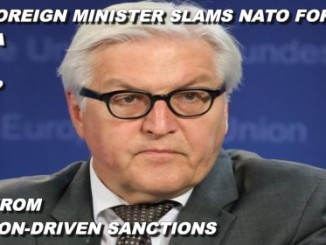
ER Editor: This from Disclose TV on Telegram (July 6) —
JUST IN – Germany’s Constitutional Court has halted the passage of the controversial heating bill by the left-green-liberal government, scheduled for this week.
The text below is machine-translated. It is rather dense. Here is a partial summary by Reuters —
Germany’s top court stalls govt climate-friendly heating bill
BERLIN, July 4 (Reuters) – Germany’s Constitutional Court on Tuesday ruled in favour of an injunction brought by a conservative lawmaker against the government’s planned heating bill, saying consultation time for the law was too short.
Christian Democratic Union (CDU) lawmaker Thomas Heilmann, Berlin’s former justice senator and a Bundestag member, last week applied for an injunction against an economy ministry bill that aims to phase out oil and gas heating systems in Europe’s biggest economy in a step to help the country become climate-neutral by 2045. … CONTINUE READING
The report makes clear that lawmakers were being required to read heaps of pages of text in an impossibly short timeframe, thus as Thomas Heilmann says, bypassing democracy.
********
Successful urgent application against the drafting of the legislative procedure for the Building Energy Act
Press release No. 63/2023 of 5. July 2023
Decision of 5. July 2023 – 2 BvE 4/23
By order of today, the Second Senate of the Federal Constitutional Court gave up the German Bundestag, the second and third reading of the federal government’s draft law on the ‘amendment of the Building Energy Act and the amendment of the sweeping and inspection regulations’ ( hereinafter: Building Energy Act ) not to be carried out within the current week of the meeting. The applicant, a member of the CDU / CSU parliamentary group in the German Bundestag, sees his rights as a member of the German Bundestag violated by the legislative process.
His application for an interim measure is successful in the matter. The main request in the organ dispute procedure appears in any case with regard to the right of the applicant to participate equally in the parliamentary decision-making process from Art. 38 para. 1 sentence 2 of the Basic Law ( GG ) neither inadmissible from the outset nor obviously unfounded. The assessment of the consequences to be carried out accordingly by the Federal Constitutional Court leads to the result that the reasons for issuing an interim order outweigh the reasons. In the special circumstances of the individual case, interest in avoiding an irreversible violation of the applicant’s participation rights under Art. 38 para. 1 sentence 2 GG compared to the interference with the procedural autonomy of the German Bundestag,that only delays the implementation of the legislative process.
The decision was made with 5: 2 votes.
The decision will be published separately on the homepage of the Federal Constitutional Court.
Facts:
The Federal Cabinet decided on 19. April 2023 the introduction of the draft amendment to the Building Energy Act. The Federal Minister of Finance stated on record that he agreed to the draft law with the awareness that the political groups of the German Bundestag would give them intensive advice in the parliamentary process and would also make further changes. The bill was May 2023 brought into the Bundestag ( BTDrucks 20/6875 ).
On the 13th. June 2023, the coalition fractions published a two-page paper entitled „ Guardrails [ … ] for further advice on the Building Energy Act “. This contains a list of „ aspects “ that modify the draft law and are to be discussed in the further procedure.
The bill was advised June 2023 at first reading in the plenary session of the German Bundestag and referred to the Committee on Climate Protection and Energy.
The committee led on 21. June 2023 held an expert hearing on the original draft law, taking into account the so-called guard rails. At the request of the coalition groups. A special committee meeting was held in June 2023. In the course of this, the date for a second hearing was mostly on the 3rd July 2023 provided that the amendments are by Friday 30. June 2023.
On the 27th. June 2023, representatives of the coalition groups presented the results of their negotiations on outstanding issues of the Building Energy Act.
On the 30th. In June 2023, the „ Formulation aid of the BMWK [ Federal Ministry for Economic Affairs and Climate Protection ] was submitted to the Committee for Climate Protection and Energy for an amendment “ to the coalition groups. It contains a 94-page synopsis of the federal government’s draft law and the proposed amendments, as well as a 14-page explanatory memorandum.
The second public hearing of the Committee on Climate Protection and Energy took place on Monday 3rd July 2023. In the afternoon of the 4th July 2023, the coalition groups submitted an amendment to the draft building energy law. On the morning of the 5th, the committee discussed again in July 2023. According to the respondent, on 7. July 2023 the second and third reading with the final vote will take place in the German Bundestag.
The applicant seeks a declaration in the main action by way of Organstreit proceedings that his rights as a member of the German Bundestag have been infringed by the legislative procedure on the Building Energy Act. The associated application for a temporary injunction is aimed at provisionally prohibiting the German Bundestag from holding the second and third readings of the aforementioned bill until all members of parliament have received the essential text passages of the bill relevant to the second reading at least 14 days in advance.
Senate Key Considerations:
The application for a temporary injunction under Section 32 of the BVerfGG is largely successful.
The application for a temporary injunction is admissible.
The main thing must not be anticipated by an interim order. An inadmissible anticipation of the main thing can be assumed if the requested content of the interim order and the legal protection objective are at least comparable, if not congruent. Based on this, the applicant does not request inadmissible anticipation of the main thing with the urgent application.
The provisional order has the consequence that the draft building energy law cannot be discussed and decided at second and third reading in the current week of the session. However, this does not at the same time decide on the further application for a declaration in the main and in particular does not find any violation of the applicant’s rights to be examined there.
- The application for an interim order is also well founded.
- The application in the organ dispute appears at the present time in view of the right of the applicant to participate equally in the parliamentary decision-making process from Art. 38 para. 1 sentence 2 GG neither inadmissible from the outset nor obviously unfounded.
a ) In particular, it cannot be ruled out that the drafting of the legislative process, including the scheduling of the second and third reading of the draft law in the German Bundestag, constitutes a permissible subject of application. That the design of a legislative procedure as a whole may violate the participation rights of the individual MP from Article 38.1 sentence 2 of the Basic Law and thus be the subject of a organ dispute, is obvious regardless of whether individual acts in this procedure are only preparatory.
b ) The application in the organ dispute is not obviously unfounded at the present time.
aa ) Article 38.1 sentence 2 of the Basic Law guarantees the status of equality of MPs in a formal and comprehensive sense. After that, all MPs are called to participate equally in the formation of parliamentary wills. The deputies not only have the right to vote in the German Bundestag, but also the right to advise. This requires sufficient information about the subject of the consultation. MEPs not only have to obtain information, they also have to be able to process it. The Senate has not yet decided what ties result from the principle of equal participation of MPs in the formation of parliamentary wills for the organization of legislative procedures. It is the parliamentary majority ( Art. 42 para. 2 sentence 1 GG ) basically reserved,determine the priorities and processes involved in processing legislative procedures. Even if it has a wide scope for design, there is some reason to believe that procedural autonomy does not require the parliamentary majority to observe the requirements of Art. 38 para. 1 sentence 2 GG guaranteed status of equality of deputies is released and the right of deputies is violated if it is completely or substantially disregarded when designing legislative procedures without factual reason.1 sentence 2 GG guaranteed status of equality of deputies is released and the right of deputies is violated if it is completely or substantially disregarded when designing legislative procedures without factual reason.1 sentence 2 GG guaranteed status of equality of deputies is released and the right of deputies is violated if it is completely or substantially disregarded when designing legislative procedures without factual reason.
bb ) Measured against this, the application for the determination of a violation of the applicant’s participation rights under Article 38.1 sentence 2 of the Basic Law is not obviously unfounded. The outcome of the main proceedings appears open. Due to the special circumstances in the implementation of the legislative procedure at issue, the question of whether the exercise of the procedural autonomy of the parliamentary majority has sufficiently taken into account the constitutionally guaranteed participation rights of the applicant, detailed examination.
The respondent himself admits a considerable compression of the temporal processes and a „ not insignificant complexity “ of the subject of the consultation. Even if the parliamentary majority has a constitutionally guaranteed further scope for the design of the procedures and the deadlines for the course of events described, which provides for the rules of procedure of the German Bundestag for the second consultation of a draft law ( Section 81 (1) sentence 2 GO-BT ), more closely, examination not affordable in the preliminary legal protection procedure,whether the applicant’s participation rights have been substantially impaired in the present case without sufficient factual reason and whether the procedural design chosen by the parliamentary majority is an improper acceleration of the legislative process.
2nd. Contrary to the respondent’s view, there is essentially no room for a summary examination of the chances of success. Can it not be determined that the main request is inadmissible or manifestly unfounded from the outset, or can the Federal Constitutional Court not decide the main matter in time, that this avoids the foreseeable serious disadvantages, the provisional arrangement can therefore be necessary – as here –, because the court lacks the time required for a conscientious ( if only summary ) examination of the legal questions that are significant for the decision of the main matter.
3rd. The assessment of the consequences to be carried out accordingly by the Federal Constitutional Court within the framework of the decision pursuant to Section 32 (1) BVerfGG leads to the result that the reasons for issuing an interim order outweigh the reasons.
a ) If the interim order were issued and the application would be largely unsuccessful, there would be a considerable encroachment on the autonomy of the parliament or the parliamentary majority and thus on the original responsibility of another supreme constitutional body. Such an intervention is fundamentally foreseeable in the proceedings for interim legal protection. In the present constellation, however, it must be taken into account that the adoption of the Building Energy Act will take effect from the 1st. January 2024 non-contacting time would remain possible without further notice. In this regard, the applicant points out that the respondent could schedule a special meeting of the German Bundestag for the current calendar month. If the respondent is based on,that if the readings are removed from the agenda this week of the session, the Federal Council can only adopt them and thus the legislative process can only be completed at the next regular meeting of the Federal Council at the end of September, he ignores the fact that the President of the Federal Council is obliged to convene it if the Federal Government so requests.
b ) If the interim order did not come about and the application in the main ( would at least be successful with regard to the asserted right to equal participation of the applicant in the parliamentary decision-making process, there would be an irreversible, substantial violation of this right. The applicant would be irretrievably deprived of the opportunity to exercise his participation rights to the extent guaranteed by constitutional law in the deliberations and resolutions on the Building Energy Act. The irreversible and substantial violation of his participation rights has an impact on the relationship between the constitutional organs at the expense of Parliament and its autonomy. Contrary to the respondent’s view, something else does not follow from the fact that,that success in the main may have a positive impact on the design of future legislative procedures.
c ) With the interim order, the Senate deviates from the applicant’s application in order to bring the rights affected after the weighing up of the consequences to an appropriate balance. The Senate takes particular account of, that the interference with the autonomy of the parliament regarding the determination of its procedures must be kept as low as possible and the defendant must continue to schedule the procedural steps of the legislative procedure in dispute Will observe the rights set out here in the impact assessment.
************
Source
Featured image: picture alliance/dpa | Fabian Sommer

••••
The Liberty Beacon Project is now expanding at a near exponential rate, and for this we are grateful and excited! But we must also be practical. For 7 years we have not asked for any donations, and have built this project with our own funds as we grew. We are now experiencing ever increasing growing pains due to the large number of websites and projects we represent. So we have just installed donation buttons on our websites and ask that you consider this when you visit them. Nothing is too small. We thank you for all your support and your considerations … (TLB)
••••
Comment Policy: As a privately owned web site, we reserve the right to remove comments that contain spam, advertising, vulgarity, threats of violence, racism, or personal/abusive attacks on other users. This also applies to trolling, the use of more than one alias, or just intentional mischief. Enforcement of this policy is at the discretion of this websites administrators. Repeat offenders may be blocked or permanently banned without prior warning.
••••
Disclaimer: TLB websites contain copyrighted material the use of which has not always been specifically authorized by the copyright owner. We are making such material available to our readers under the provisions of “fair use” in an effort to advance a better understanding of political, health, economic and social issues. The material on this site is distributed without profit to those who have expressed a prior interest in receiving it for research and educational purposes. If you wish to use copyrighted material for purposes other than “fair use” you must request permission from the copyright owner.
••••
Disclaimer: The information and opinions shared are for informational purposes only including, but not limited to, text, graphics, images and other material are not intended as medical advice or instruction. Nothing mentioned is intended to be a substitute for professional medical advice, diagnosis or treatment.





Leave a Reply